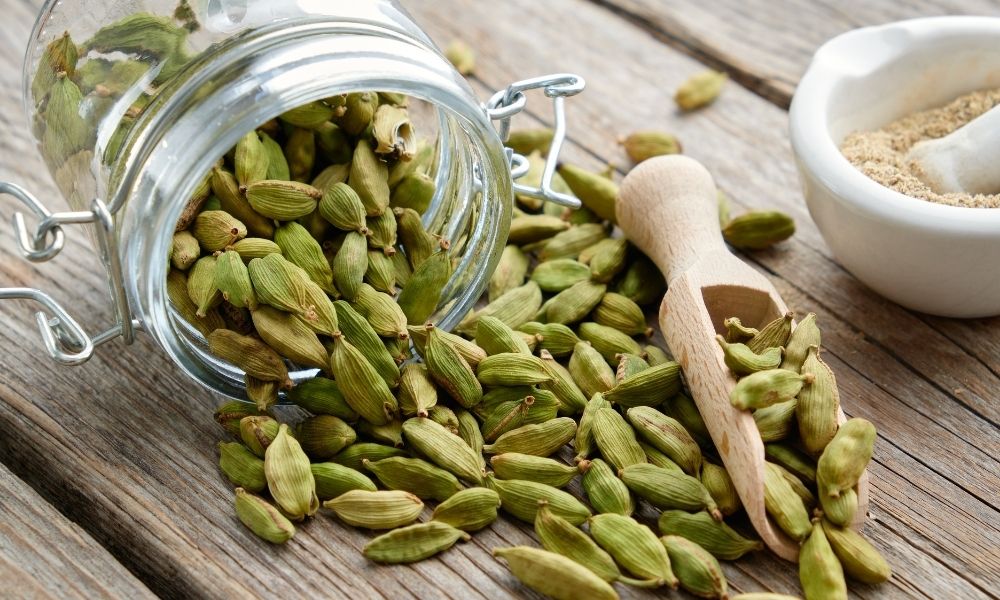Food
7 Benefits of cardamom and side effects

Food
6 Benefits of sweet orange essential oil

Table of Contents
Food
13 Health Benefits Of Consuming Figs

Table of Contents
- What is the fig?
- Types of figs
- History of figs
- Health Of Benefits of figs
- 1.- Avoid cancer
- 2.- Rich in fiber
- 3.- Blood pressure lowering effect
- 4.- Strengthen your bones
- 5.- Reduces the risk of macular degeneration
- 6.- Reduces a sore throat
- 7.- Helps with cardiovascular function
- 8.- Improve reproductive health
- 9.- Helps lose weight
- 10.- Natural cure for anemia
- 11.- Improve digestion
- 12.- Promote hair growth
- 13.- Soft and flexible skin
- Related
-
The health benefits of consuming figs are due to their nutritious compounds, their sweet taste is the nectar of flavor, they are rich in sugar which makes them a delicious fruit, but is their consumption healthy for the body?
Figs are good sources of dietary fiber, antioxidants, minerals, and vitamins.
They are rich in potassium, calcium, magnesium, copper, and iron and contain vitamins A, B6, E, and K, which contribute to optimal health and well-being.
Figs are a sweet fruit with multiple seeds and smooth skin, which can be eaten ripe or dried.
Figs are also called nature’s sweets because they are high in natural sugar.
It is the fruit of the fig tree, which is a member of the blackberry family, generally found in Asia. In India, the fruit is called anjeer.
Different varieties of the fruit can have different colors of purple, red, green, and golden yellow. The most popular types of figs include:
Types of figs
There are five common varieties of figs. Each type differs subtly in taste and sweetness. They are:
1.- Black Mission: Black Mission figs are black-purple outside and pink inside.
They are incredibly sweet and even ooze syrup.
They are perfect for eating as a dessert or mixing cake or cookie recipes to increase flavor.
2.- The kadotas: They are green with purple pulp and less sweet among all the varieties of figs.
They are great to eat raw and also taste good if heated with a pinch of salt.
3.- Cali Myrna: They are greenish-yellow figs on the outside and amber on the inside.
They are larger compared to other types of figs and have a unique and strong nutty flavor.
4.- Brown Turkey: Figs of this type have purple skin and red meat.
Its flavor is mild and less sweet than the other type of figs. They work well in salads.
5.- Adriatic: Adriatic figs have light green skin and are pink on the inside.
These figs are often used to make fig bars.
They are also called white figs as they are very light in color. They are extremely sweet and can be enjoyed as a simple fruit dessert.
History of figs
The name ‘fig’ originates from a Latin word called ‘ficus’ and an older Hebrew name called ‘flag.
They were native to India and Turkey and came to America in the 17th century.
Neolithic excavations of fig remain to date back to 5000 BC were discovered.
They are even mentioned in the Bible as a sign of peace and prosperity.
Figs were widely cultivated in the Middle East and Europe and reached China in the mid-17th century.
Spanish missionaries planted the world-renowned fig orchards in California in the late 1800s.
The Assyrians used figs as sweeteners in 3000 BC. The fig plant is known to be the first plant cultivated by humans.
Aristotle described fig cultivation in Greece in his works. Figs were also a common food source for the Romans.
The Greeks and Romans distributed the fruit in the Mediterranean region.
Applications
Figs are sweet and soft and their paste is often used as a substitute for sugar.
Fig spread is used as a healthier option in place of corn syrup and sucrose.
It is incorporated into cakes, puddings, pies, assorted baked goods, and preserves. Figs are considered a healthy snack.
Health Of Benefits of figs
The health benefits of consuming figs reduce the risk of cancer since they contain various substances such as the flavonoid quercetin and several studies have shown that it can contribute to a lower risk of lung cancer and colon cancer.
1.- Avoid cancer
Besides quercetin, figs also contain luteolin; Another type of flavonoid.
This substance can stop the growth of tumors because it neutralizes free radicals.
Luteolin primarily affects preventing the development of skin cancer, but it can also be important during skin cancer treatment.
2.- Rich in fiber
Fiber may protect against breast cancer in postmenopausal women.
This is possible because the hormonal balance of these women can fluctuate a lot, causing the hormones to affect the immune system.
This can prevent the body from fighting cancer-causing free radicals.
However, by getting enough fiber, the body can protect itself against this.
3.- Blood pressure lowering effect
Figs contain a large amount of potassium.
This is an important mineral that maintains heart rate and blood pressure.
Eating figs can have a blood pressure-lowering effect for this reason.
4.- Strengthen your bones
Eating figs can strengthen your bones.
This has to do with a large amount of calcium you get when you eat figs regularly.
Calcium is known to be important for strong bones and can reduce the risk of osteoporosis.
In addition to calcium, figs also contain phosphorus.
This substance promotes bone growth, causing the bone to heal faster after damage.
5.- Reduces the risk of macular degeneration
Macular degeneration is an eye condition in which visual acuity decreases.
This often happens as people age.
If you eat 3 or more servings of fruits (such as figs, strawberries, olives, or avocado) per day, you could reduce your chance of macular degeneration by 36%.
This is compared to people who eat less than 1.5 servings of fruit per day.
6.- Reduces a sore throat
Figs contain a large amount of mucilage. This is a sticky substance that is also known as plant glue.
It is a natural remedy that works very well against a sore throat.
7.- Helps with cardiovascular function
Figs are a good source of potassium, a mineral that helps lower blood pressure.
In animal studies, pectin is a soluble fiber in fig leaves and has been shown to contribute to lower triglyceride levels in the body.
Figs also contain high levels of antioxidant polyphenols that have been shown to help prevent atherosclerosis.
8.- Improve reproductive health
Clinical studies have shown that figs help increase sperm motility, this is essential for reproductive health.
Researchers believe that this compound can be linked to the amino acids, magnesium, and calcium found in figs.
9.- Helps lose weight
The dietary fiber and low-calorie count in figs were found to have positive correlations with weight loss It also helps intestinal transit and promotes good digestion.
10.- Natural cure for anemia
Anemia is a condition in which your body does not have enough healthy red blood cells to carry adequate oxygen to your tissues.
Figs contain copper and iron, two minerals that are necessary for the formation of red blood cells and cell oxidation.
Figs also contain prebiotics, which helps the good bacteria already in the intestine.
Good bacteria are essential to maintain optimal digestion.
12.- Promote hair growth
Hair loss usually occurs due to a lack of proper nutrition.
Figs contain hair-friendly nutrients like magnesium, vitamin C, and vitamin E that promote hair growth
The essential nutrients present in this fruit stimulate blood circulation in the scalp to accelerate hair growth.
13.- Soft and flexible skin
Figs contain a high amount of vitamin C, a powerful antioxidant that helps to brighten and balance skin tone.
Blend five figs for a smooth paste.
Add a teaspoon of powdered oatmeal and milk and a half teaspoon of powdered dried ginger.
Mix well to form a smooth paste.
The potential health risks associated with figs are:
1) High sugar content
Dried figs are high in sugar and calories compared to fresh figs, 55 percent of their weight is sugar.
This equates to 185 calories per 1/2 cup. If you have diabetes or prediabetes, don’t eat figs too often and only on the advice of your doctor or nutritionist.
2) Laxative effect
Due to its high fiber content, it can have a mild laxative effect and should not be eaten in excess, especially when it comes to dried figs.
3) Oxalates
Figs also contain natural substances called oxalates.
When oxalates are concentrated in body fluids, they can crystallize and cause health problems like gallbladder and kidney stones.
Therefore, people with kidney or gallbladder problems should avoid eating figs.
4) Contains sulfites
Dried figs can be treated with sulfur dioxide gas during processing to help prevent oxidation.
They can also be treated with sulfites to extend their shelf life.
People who are sensitive to sulfites should avoid foods that contain sulfites, such as dried figs.
Five percent of asthmatics can be exposed to sulfites that cause an allergic reaction in them.
Note: Never eat green figs.
They produce white latex that contains compounds like furocoumarins and 5-methoxy psoralen (5-MOP), which can cause a severe allergy around the mouth and lips that can spread rapidly to other parts of the body.
We hope the article on the health benefits of 13 Health Benefits Of Consuming Figs has been of help to you.
Food
5 Benefits of drinking black tea with lemon

Table of Contents
- 1. Increases iron absorption
- 2. Fight against free radicals
- 3. Helps lose weight
- 4. Cleanses the body of toxins
- 5. A remedy for sore throat
- Related
- Discover the 5 Benefits of drinking black tea with lemon.
Black tea is one of the most consumed teas in the world. It is made from the leaves of the Camellia sinensis plant.
Its leaves are fermented in the air before being dried, cured, and packaged. Soak these leaves in the boiling water for about 5 minutes and you will get a low-calorie black tea. This has several health benefits.
The benefits can be better realized if you do not add sugar or milk to black tea. However, unsweetened black tea may not taste good, and this is where lemon comes to the rescue!
A squeeze of half a lemon not only imparts flavor but also enhances the benefits of black tea.
Unsweetened black tea, when added with a twist of lemon, is therapeutic and refreshing.
Lemon is rich in vitamin C which strengthens the immune system.
Both black tea and lemon have antioxidants that prevent heart and neurodegenerative diseases.
The stimulating and diuretic properties help increase metabolism and eliminate toxins.
The mixture also prevents us from gaining weight.
These are the benefits of adding lemon juice to your black tea.
1. Increases iron absorption
Lemon is rich in vitamin C. It also contains vitamin B6, iron, magnesium and calcium. Daily lemon consumption ensures proper growth and repair of body tissues and strengthens the immune system.
When added to tea, it also serves another important purpose. Tea is known to reduce the absorption of iron (non-heme or iron from plant sources) in the body. Lemon improves the absorption of iron in the body.
Plus, adding it to black tea doesn’t hamper its nutritional benefits, making the duo a healthy combination to consume.
2. Fight against free radicals
Both black tea and lemon juice have antioxidants that remove free radicals from our bodies. While black tea has theaflavins, lemon juice has ascorbic acid, or vitamin C, which together remove a greater number of free radicals from the body.
These potentially keep brain-damaging diseases like Parkinson’s and Alzheimer’s at bay. Antioxidants also help prevent the hardening of the arteries, kidney stones, and heart attacks.
3. Helps lose weight
Black tea contains caffeine, which is a stimulant. Stimulants generally have properties that suppress appetite, thus reducing food intake. This, in turn, helps you limit your portions and avoid overeating, ultimately preventing you from packing on those extra pounds.
Unsweetened black tea has zero calories. Lemon has about 8 calories per ounce, which is negligible. This zero-calorie drink hardly increases your body weight at all. Just avoid sugar.
Black tea also has micronutrients called catechins, which can prevent the absorption of fat in the body. And, any action that prevents fat absorption indirectly contributes to weight loss.
Also, avoiding milk, sugar, or whipped cream would be ideal, as you cut down on a ton of calories that are sure to derail your weight loss plans.
Drinking a cup of black tea with a squeeze of lemon half an hour before a meal is beneficial in achieving this goal.
4. Cleanses the body of toxins
Both caffeine and lemon juice have diuretic properties, which increase urine production. They eliminate toxins at a faster rate. This is beneficial when there is an infection, as the viruses or bacteria are expelled in a short time.
However, it is important to consult your doctor before consuming black tea with lemon during illness, as caffeine may interfere with the way some medications work.
5. A remedy for sore throat
Adding honey to black tea with lemon makes it a perfect therapy for sore throats and colds. While caffeine acts as a stimulant and pain reliever, the lemon flushes out toxins and the honey provides a soothing effect on the throat.
Drinking a cup of this concoction twice a day will help you get rid of the infection faster. It also acts as a detoxifier by aiding digestion.
Black tea with lemon is safe for regular consumption. Simply limit consumption to a cup or two per day. And don’t add sugar or milk.
-

 Benefits4 months ago
Benefits4 months agoThe Benefits of Joining Gym Lumolog – Improve Your Fitness & Health
-

 Food1 year ago
Food1 year ago10 + Benefits of carrot juice and side effects
-

 Health1 year ago
Health1 year ago50 Super Healthy (And Very Often Cheap) Foods
-

 Health1 year ago
Health1 year ago5 Shocking health benefits of kinkeliba and side effects
-

 Food1 year ago
Food1 year ago8 shocking benefits of leek juice and side effects
-

 Health1 year ago
Health1 year ago15 health benefits of soursop leaves tea and side effects
-

 Health1 year ago
Health1 year ago15 Benefits of lipton tea and side effects
-

 Health1 year ago
Health1 year agoBenefits of guava leaves Sensually












